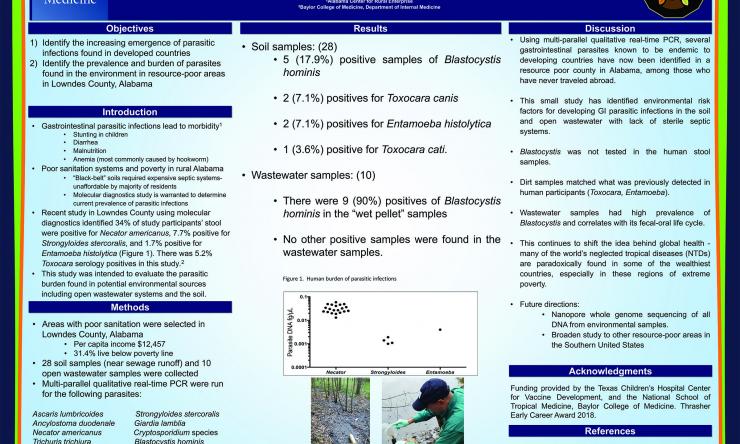Ad salute pauperum - Health for the poor
About the Lab
The Laboratory of Human Parasitology is dedicated to improving understanding and treatment of parasitic infection through advancing systems of their diagnoses. The laboratory's work involves defining the prevalence and parasitic burden in endemic populations and associating with morbidity in biological systems, while keeping the cost of diagnoses at a reasonable level, with goals of eradication and improvement in healthcare outcomes.
Laboratory projects include the following:
Molecular Diagnostics of Gastrointestinal Parasites
Because gastrointestinal parasites often thrive in areas of high poverty, there is often a lack of resources for diagnosis, leading to underestimation of the disease burden and in turn to lack of treatment. The Laboratory of Human Parasitology is currently implementing new technology that can be used even in relatively resource-limited areas. In one study, the laboratory is using a testing platform designed by laboratory director Dr. Rojelio Mejia and his colleagues during his time at the National Institutes of Health.
The platform involves quantitative polymerase chain-reaction (qPCR) that evaluates the DNA of a stool sample much more accurately and quickly than traditional microscopy methods. The study involves integrating qPCR testing with microscopy testing for intestinal parasites including Ascaris lumbricoides, Ancylostoma duodenale, Necator americanus, Strongyloides stercoralis, Trichuris trichiura, Giardia lamblia, Entamoeba histolytica and Cryptosporidium parvum in the relatively resource-limited areas of Quinindé, Esmeraldas, Ecuador. Read more about the study in an article recently appearing in the American Journal for Tropical Medicine, "A novel, multi-parallel, real-time polymerase chain reaction approach for eight gastrointestinal parasites provides improved diagnostic capabilities to resource-limited at-risk populations."
Serological Diagnostics for Strongyloides Stercoralis
Since patients may be infected with Strongyloides and not have larvae in the stool at the time of testing, for a complete diagnosis of parasitic infection, serological testing is needed in addition to molecular testing at the DNA level. For detection of strongyloidiasis, we will also employ the use of a Strongyloides stercoralis ELISA using a recombinant protein to look for IgG Strongyloides specific antibody in serum. Strongyloides is an auto-infectious parasite, with intermittent shedding of ova/larvae into the stool.
Read more about Strongyloides here: "Screening, prevention, and treatment for hyperinfection syndrome and disseminated infections caused by Strongyloides stercoralis" by Dr. Rojelio Mejia and Dr. Thomas Nutman.
| Location | Study | Collaborator |
|---|---|---|
| Alabama | Diagnoses of hookworm in Alabama | Alabama Center for Rural Enterprise |
| Argentina | Intestinal parasites and microbiome | Universidad Nacional de Salta Argentina |
| Brazil | Molecular diagnoses of intestinal parasites in comparison to GIS modeling | Louisiana State University |
| Colombia |
Environmental impact on intestinal parasitic infections | Universidad-CES |
| Ecuador | Impact of intestinal parasites on growth delays | Universidad Internacional De Ecuador |
| Guatemala | Impact of intestinal parasites on growth and nutrition | Escuela de Nutrición-Universidad Francisco Marroquin |
| Honduras | Immunological impact of intestinal parasites on growth | Universidad Nacional Autónoma de Honduras |
| Houston | Diagnoses of intestinal parasites in children presenting with diarrhea | Texas Children’s Hospital |
| Mozambique |
Impact of intestinal parasites on malaria co-infections | Centro de Investigaçāo em Saúde de Manhiça |
| New York City | Soil detection of Toxocara canis/cati in city parks of the 5 boroughs | University of Texas-Houston |
| Uganda |
Impact of intestinal parasites on HIV immune activation | The AIDS Support Organization |
| Swaziland | Impact of intestinal parasites on TB co-infections | Global Health Baylor College of Medicine |
Future Projects
There is a great need for modern, more sensitive diagnostics above and beyond standard microscopy and the current standard of care for poverty-associated infections and diseases. Future projects for the laboratory include expanding PCR and ELISA diagnostics for Plasmodium falciparum, vivax, ovale, malariae, and knowlesi, as well as Cyclospora cayetanensis, Isospora belli, Microsporidia (Encephalitozoon intestinalis and Enterocytozoon bieneusi), and Schistosoma mansoni and haematobium.
Laboratory Facilities
The Laboratory of Human Parasitology is located at Texas Children's Hospital Center for Vaccine Development.
The laboratory facilities include an ABI ViiA™ 7 Real-Time PCR instrument with 6 dye capabilities. The ABI ViiA is able to detect amounts as small as 10 attograms of parasite DNA. The laboratory also has a SpectraMax M3 microplate reader for ELISA and serology.
Environmental Study Series
Dr. Rojelio Mejia, director of the Laboratory of Human Parasitology, discusses the environmental study his team effected in Januaria, Brazil
Parasites in Rural Alabama
View the full sized poster.








